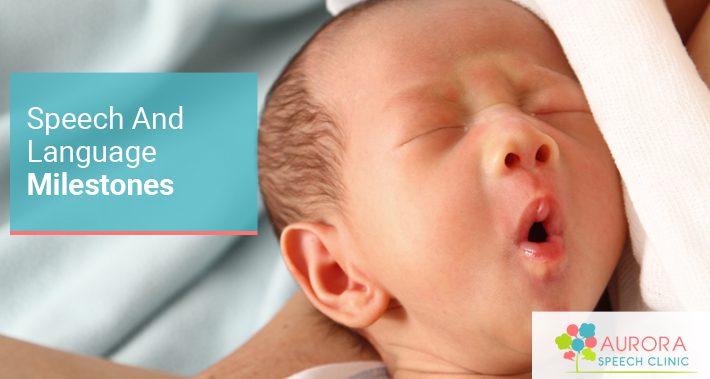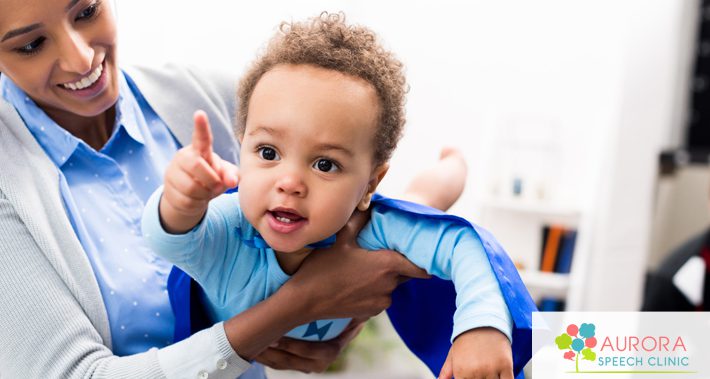
Parenthood is a journey filled with countless milestones, each one a testament to the growth and development of your precious little one.
In this blog post, we will explore speech and language developmental milestones.
From those adorable first babbles to the elaborate conversations that follow, understanding the trajectory of communication development can help you foster a communication rich environment at home and/or identify areas of your child’s development that might benefit from extra attention and support.
Outlined below are the speech and language developmental milestones you may notice from infancy through the preschool years.
Infancy (0-12 months): Building The Foundations
The first year of a child’s life is a period of rapid growth and development.
While they may not be speaking words just yet, there are important milestones that set the stage for future language acquisition.
These milestones include:
Cooing (2-4 months)
Infants typically begin cooing, producing soft, vowel-like sounds such as “ahh” and “ooh.”
These sounds are a sign that they are discovering and learning to control their vocal cords.
Babbling (6-9 months)
Around this age, babies start babbling, combining consonant and vowel sounds, like “ba-ba” or “ma-ma.”
Speech therapists and linguists refer to these sounds as “proto-words”.
While they don’t communicate any information, they are an early attempt at imitating the speech your baby hears.
Gestures and Nonverbal Communication
During the first year, infants also develop nonverbal communication skills.
This includes things like:
- Making eye contact
- Recognizing the direction sound comes from
- Pointing at things they want
- Using facial expressions to communicate emotions
- Understanding simple games like peekaboo or patty cake
- Listening to stories you read to them
Toddlerhood (1-2 years): Emerging Language
As children move into their toddler years, their language skills become more developed.
As a result, they begin to express themselves in more meaningful ways.
The milestones you can expect your toddler to reach at this point include:
First Words (12-18 months)
Most children start saying their first words around their first birthday.
These initial words are often simple and may include common objects, actions, or people in their immediate environment.
According to Wordbank, a review of thousands of reports, the ten most common words babies learn in North America are:
- Mama/mommy
- Dada/daddy
- Ball
- Bye
- Hi
- No
- Dog
- Baby
- Woof woof
- Banana
Vocabulary Growth
By 18 months, toddlers typically have a vocabulary of around 50 words or so.
They’re beginning to expand their language skills and can identify and name objects, animals, and people in their surroundings.
Two Word Phrases (18-24 months)
Around their second birthday, children usually start combining two words to form simple phrases.
For example, they might say “more juice” or “big truck.”
Telegraphic Speech
Toddlers’ speech at this stage may resemble telegraphic speech, where they omit certain words and focus on conveying essential information.
For instance, they might say “milk gone” instead of “the milk is all gone.”
Telegraphic speech gets its name from the language used to communicate messages via telegram in the 19th century, when telegraph companies would charge by the word.
Pronunciation
While it’s common for toddlers to have pronunciation errors, they should be intelligible to familiar listeners by the time they’re two years old.
In particular, they should be proficient in using the speech sounds ‘p’, ‘b’, ‘m’, ‘h’, and ‘w’.
Some more complex speech sounds, like ‘th’ and ‘r,’ may still be challenging for them.
Directions
By your child’s second birthday, they should understand simple one part instructions.
This includes things like “pick up the ball” or “look at the fridge”.
They should also begin understanding how to answer simple questions, like “where is the ball?” or “where is the fridge?”
Preschool Years (3-5 years): Developing Complexity
Preschool marks a significant period in a child’s speech development, as they begin to construct more complex sentences and engage in meaningful conversations.
These milestones include:
Expanding Vocabulary And Grammar (3-5 years)
During this stage, children continue to expand their vocabulary, learning new words at a rapid pace.
They can now describe objects, actions, and emotions with more precise language.
This expanding language includes things like:
- Basic pronoun use
- The difference between singular and plural
- The names of colours and shapes
- Location based adjectives like in, on, over, under, etc.
- Time based words, like yesterday, today, tomorrow, etc.
- Opposites, like tall or short, big or little, etc.
- Placing things in sequential order (first, second, third, etc.)
Complex Sentences (4-5 years)
Children progress from using two word phrases to constructing more complex sentences.
They can express ideas, narrate stories, and ask questions using a combination of subjects, verbs, and objects.
They may even include rhyming in their stories.
They should also start understanding how to answer and ask questions built around who, what, where, when, how, and especially why.
You will likely start hearing your child ask “why?” repeatedly around this age.
At first, your child’s sentences might be repetitive and have grammatical errors.
An example of this might be ‘I goed for a walk with Joey’.
However, their sentences will become more complex, and with fewer errors, as their language abilities develop.
Reading to your child from a young age is a great way to reinforce vocabulary acquisition and grammar use.
Reading also helps your child build an understanding of how stories work and tell their own stories (about their day, fictional, or re-told from a book).
RELATED: Tips To Help Your Child Learn To Read
Social Interaction
Communication development is not just about words. It also involves understanding social cues and taking turns in conversations.
As children get older, they become more aware of the need to listen and respond appropriately to the communication of others.
In the preschool years, you may notice your child having longer back and forth conversations that include them asking questions, making related comments to what you have said, and also reading non-verbal communication cues during conversation.
All of these skills can be helpful for interacting successfully with adults and peers alike.
Articulation
Pronunciation continues to improve, and most children can articulate all the speech sounds correctly by the age of 5.
Some minor errors with “later developing sounds” may still persist.
Other
Other milestones your child is expected to reach by age 5 include:
- Code switching (using simpler sentences when talking to younger kids, using “indoor voice”, etc.)
- Using more than one verb in sentences
- Repeating themselves when asked
- Following classroom directions
- Among others

Factors Influencing Speech and Language Development
These above milestones provide a general framework for communication development.
However, it’s essential to remember that each child is unique, and there can be considerable variation in the timing of these milestones.
Additionally, several factors can influence a child’s speech development.
These may include:
Genetics
Genetic factors can play a role in speech development.
Some children may be more predisposed to developing language skills earlier, while others may require more time and support.
Environment
A rich and stimulating environment with frequent interaction and exposure to language can foster communication development.
Reading to children, engaging in conversations, and providing a variety of experiences can be beneficial.
However, it’s important to remember that you did NOT cause your child’s speech or language delay or disorder. In most cases, there is no identifiable cause.
Health And Hearing
Physical and health issues, as well as hearing problems, can affect communication development.
In particular, children with hearing loss will have more difficulty building their speech skills, since they can’t as easily listen to and imitate those around them.
Regular checkups and early intervention can help address any underlying concerns.
Underlying Conditions
Certain conditions may affect your child’s speech and language development.
These include, but are not limited to:
- Autism spectrum disorder
- Down syndrome
- Cerebral palsy
- Speech sound disorders like childhood apraxia of speech or dysarthria
- A neurological disorder caused by traumatic brain injury
- Being born prematurely
When to Seek Help
While there is a wide range of normal development in speech and language skills, it’s important to monitor your child for any signs of potential delays or disorders.
Your family doctor will also do the same at your child’s regular check-ups.
If you notice the following, it’s advisable to speak to your doctor or book a pediatric speech therapy evaluation here at Aurora Speech Clinic:
- Not babbling or using words by 18 months
- Having a limited vocabulary by 2 years old
- Having trouble pronouncing words beyond age 5
- Having trouble building social skills
- Has met milestones previously, but is now regressing
Book Your Appointment With Aurora Speech Clinic Today
Speech-language pathologists can assess a child’s speech and language development and provide strategies and therapy to support their progress.
If you notice your child is falling short of the speech milestones discussed in this article, don’t hesitate to seek out professional support.
In all cases of communication delays or disorders, early intervention is key.
Book your appointment with Aurora Speech Clinic today.
372 Hollandview Trail, #302,
Aurora, ON L4G 0A5
(905) 503-4321
» https://goo.gl/maps/fg3XKnNsczzwLzTz7
Aurora Speech Clinic is located in Aurora, ON and offers personalized skilled intervention to those struggling with their speech and language skills. Services offered include screening, consultation, and comprehensive evaluation. We also provide one-on-one and/or group therapy for speech sound disorders, receptive/expressive language delay/disorder, stuttering/cluttering, accent reduction, and much more.